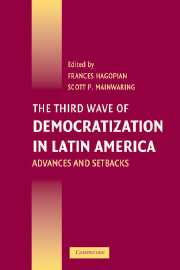Book contents
- Frontmatter
- Contents
- List of Figures
- List of Tables
- List of contributors
- Acknowledgments
- Introduction: The Third Wave of Democratization in Latin America
- 1 Latin American Democratization since 1978: Democratic Transitions, Breakdowns, and Erosions
- PART I THREE DEMOCRATIC GIANTS WITH AUTHORITARIAN PASTS: ARGENTINA, BRAZIL, AND MEXICO
- PART II UNEXPECTED DEMOCRACIES IN UNLIKELY COUNTRIES: BOLIVIA, EL SALVADOR, AND GUATEMALA
- PART III DEMOCRATIC EROSIONS IN THE THIRD WAVE: COLOMBIA, PERU, AND VENEZUELA
- 8 From “Restricted” to “Besieged”: The Changing Nature of the Limits to Democracy in Colombia
- 9 Peru 1980–2000: Chronicle of a Death Foretold? Determinism, Political Decisions, and Open Outcomes
- 10 Explaining Democratic Deterioration in Venezuela through Nested Inference
- PART IV Conclusions
- References
- Index
9 - Peru 1980–2000: Chronicle of a Death Foretold? Determinism, Political Decisions, and Open Outcomes
Published online by Cambridge University Press: 05 September 2012
- Frontmatter
- Contents
- List of Figures
- List of Tables
- List of contributors
- Acknowledgments
- Introduction: The Third Wave of Democratization in Latin America
- 1 Latin American Democratization since 1978: Democratic Transitions, Breakdowns, and Erosions
- PART I THREE DEMOCRATIC GIANTS WITH AUTHORITARIAN PASTS: ARGENTINA, BRAZIL, AND MEXICO
- PART II UNEXPECTED DEMOCRACIES IN UNLIKELY COUNTRIES: BOLIVIA, EL SALVADOR, AND GUATEMALA
- PART III DEMOCRATIC EROSIONS IN THE THIRD WAVE: COLOMBIA, PERU, AND VENEZUELA
- 8 From “Restricted” to “Besieged”: The Changing Nature of the Limits to Democracy in Colombia
- 9 Peru 1980–2000: Chronicle of a Death Foretold? Determinism, Political Decisions, and Open Outcomes
- 10 Explaining Democratic Deterioration in Venezuela through Nested Inference
- PART IV Conclusions
- References
- Index
Summary
Peru is a revealing case for assessing the advances and setbacks of democratization in Latin America because it challenges conventional interpretations, questions the role of structural variables or social prerequisites in explaining the different routes the countries in the region have followed in their democratic histories, and illustrates the importance of decisions taken by political actors. In theoretical terms, my analysis of the Peruvian experience follows the line of reasoning set out by Juan Linz in analyzing the breakdown of democracies (1978) and by O'Donnell and Schmitter (1986) in analyzing the transitions from authoritarian rule. It also challenges conventional interpretations of the Peruvian case that commit what Bendix (1964) calls the fallacy of “retrospective determinism” – biasing the analysis of the case by looking only at the elements that fit with the final outcome – by summoning the shortcomings of democracy during the 1980s to explain the collapse of the party system and the democratic regime in 1992 or by focusing on the elements that characterize the Fujimori regime as corrupt to explain its fall in 2000. These facile interpretations ignore the complexity of the Peruvian case, the fact that these were unexpected outcomes, and the fact that Peru's history was, and still is, open to diverse outcomes.
The conventional view maintains that Peru was unlikely to consolidate democracy from the very beginning of the Third Wave of democratization, given its history of absence of democratic institutions and its structural constraints.
- Type
- Chapter
- Information
- The Third Wave of Democratization in Latin AmericaAdvances and Setbacks, pp. 261 - 288Publisher: Cambridge University PressPrint publication year: 2005
- 4
- Cited by



